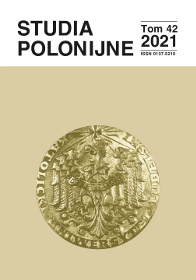From the History of Polish Academic Organisations in Lithuania
Main Article Content
Abstract
In the period between the World Wars, the numerous Polish minority in the Republic of Lithuania (or Kaunas Lithuania, as Poles used to call it) found themselves in a very precarious position. It was due to severed diplomatic relations between Lithuania and Poland and the hostile attitude of the Lithuanian authorities towards the Polish residents. Many of the Poles in Lithuania were young people of university age. At that time, new ideological and organisational initiatives would reach the Republic of Lithuania through various channels from the academic centres of Vilnius (then in the Republic of Poland). However, it was only after the establishment of Kaunas University that many young Poles were admitted to various faculties. In 1925, an idea was put forward to establish an organisation for the Polish academic youth. This is how the Union of Polish Students of the University of Lithuania was formed. This fact raised hopes for some form of Polish-Lithuanian reconciliation. The Polish youth studying at the university in Kaunas were more eager to seek mutual collaboration than the older generation of compatriots. The same was true about the views and forms of ideological and organisational work. For example, a number of views and initiatives surfaced that aimed to consolidate and unite the entire youth movement around the situation of the Polish minority in Lithuania.
This becomes evident when exploring the ideological spirit and programme of annual rallies and celebrations held by the Polish academic youth in Lithuania. The movement spawned many outstanding activists who tried to adopt a broader approach to of the Polish initiatives in Lithuania instead of narrowing them down to the usual stereotypes created in the time of Polish-Lithuanian dispute and conflicts. The leading role in this process was assumed by the Union of Polish Students of the University of Lithuania in Kaunas (in 1930 named after Duke Vytautas the Great). This organisation influenced the entire Polish community in Lithuania, whose intelligentsia had already been severely depleted. The union also enjoyed a significant position at the university in Kaunas as well as among the entire academic fraternity in Lithuania and abroad.
Many merited participants of the anti-Soviet and anti-Nazi opposition struggling for the Polish cause in the following years were recruited from among the ranks of the academic youth. After WW2, the survivors settled in in Białystok, Gdańsk, Olsztyn, Toruń, Warsaw, and Wrocław.
Article Details
References
Zespół Ministerstwo Spraw Zagranicznych, sygn. 947, 6141, 6158, 10217, 2315
Światowy Związek Polaków Zagranicą, sygn. 275, 475
Litewskie Archiwum Państwowe w Kownie [LVA], F. 1654, F. 1169
„Iskry” 1927-1934.
Jackiewicz M., Polskie życie kulturalne w Republice Litewskiej 1919-1940, Olsztyn: Wydawnictwo Wyższej Szkoły Pedagogicznej w Olsztynie 1997.
Sawicki J., Rozkwit i upadek. Polski ruch akademicki na Litwie w latach 1922-1940, „Magazyn Wileński” 1997, nr 1.
Schummer E.M., Nowa Litwa, Warszawa 1930.
„Sprawy Narodowościowe” 1929-1938.

